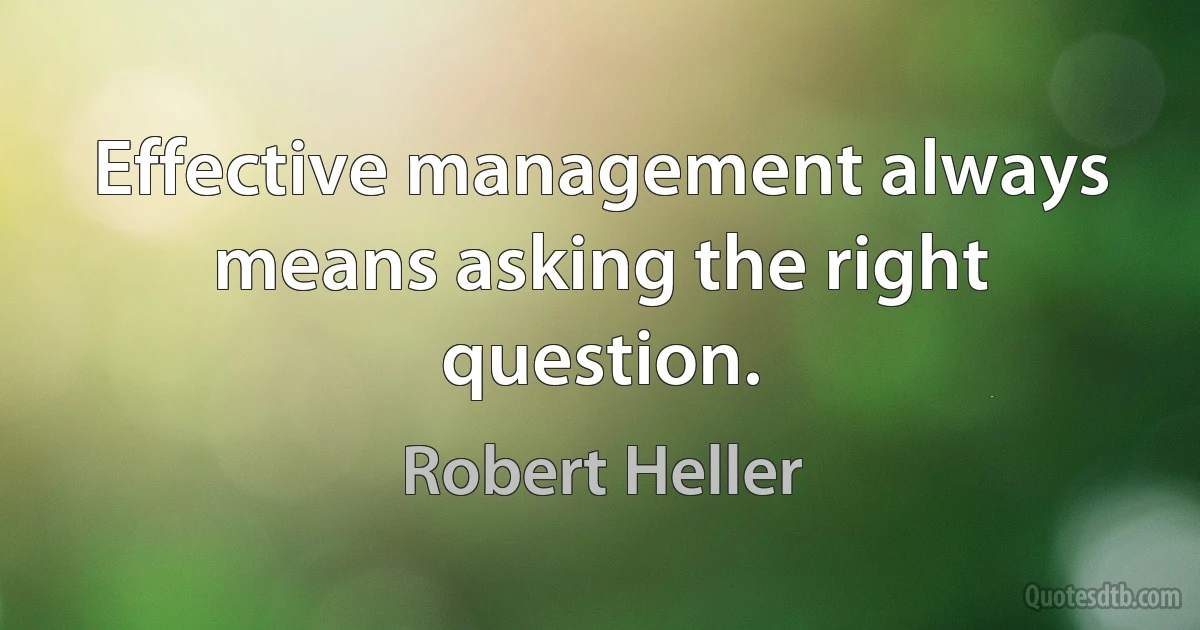Robert Heller quotes
Management is a far more homely business than its would be scientists suggest, more closely allied to cookery than any other human activity. Like cooking, it rests on a degree of organisation and on adequate resources. But just as no two chefs run their kitchens the same way, so no two managements are the same.

Robert Heller
Two of my favourite current management writers are Americans – Clayton Christensen and Peter Senge. My all-time favourite gurus are Peter Drucker, who became a greatly admired friend, and W. Edwards Deming. The thing that set these people apart from many other business commentators is that they didn't propose any all - encompassing theories, they simply told it like it is.
The fact is that life cannot be summarised as a simple set of rules; it's far too complicated for that and it's always changing. Unfortunately, all-encompassing panaceas do seem to be popular and certainly sell books, which is why I so value the objectivity of thought that each of these people brought to the debate.

Robert Heller
Common sense suggests that some factors in a [risk management] process are more important than others - and analysis supports this. In reality, only 20 percent of activities. In reality, only 20 percent of activities may account for up to 80 percent of results. This is known as Pareto's law, the "80/20 rule”...Pareto's law concentrates on the significant 20 percent and gives the less important 80 percent lower priority.

Robert Heller
Although he reputedly hated the label of ‘guru', Peter Drucker was, by any standards, the greatest management guru the world has yet seen. In 1996, the McKinsey Quarterly journal described him as the ‘the one guru to whom other gurus kowtow' and Robert Heller described him as ‘the greatest man in the history of management', praise indeed for a man who described himself as ‘just an old journalist'.

Robert Heller
Management - The definition that includes all the other definitions in this book and which, because of that, is the most general and least precise. Its concrete, people meaning - the board of directors and all executives with the power to make decisions - is no problem, except for the not-so-little matter of where to draw the line between managers who are part of "the management" and managers who are not.

Robert Heller
Decision tree - The most picturesque of all the allegedly scientific aids to making decisions. The analyst charts all the possible outcomes of different options, and charts all the latters' outcomes, too. This produces a series of stems and branches (hence the tree). Each of the chains of events is given a probability and a monetary value.

Robert Heller
When I left university I had two objectives; I wanted to write and I wanted to get married. The only way I could afford both was to get a job as a journalist. At that time, the National Union of Journalists was very powerful and would not allow the direct recruitment of journalists from college except under special circumstances. The Financial Times was deemed special and duly recruited a cadre of very bright young people. I joined the FT as part of that now celebrated intake and, as a result, found myself working on a business newspaper.

Robert Heller

![What goes wrong [in long-range planning] is that sensible anticipation gets converted into foolish numbers: and their validity always hinges on large loose assumptions. (Robert Heller)](https://cdn.quotesdtb.com/img/quotes_images_webp/71/robert-heller-anticipation-large-524671.webp)
